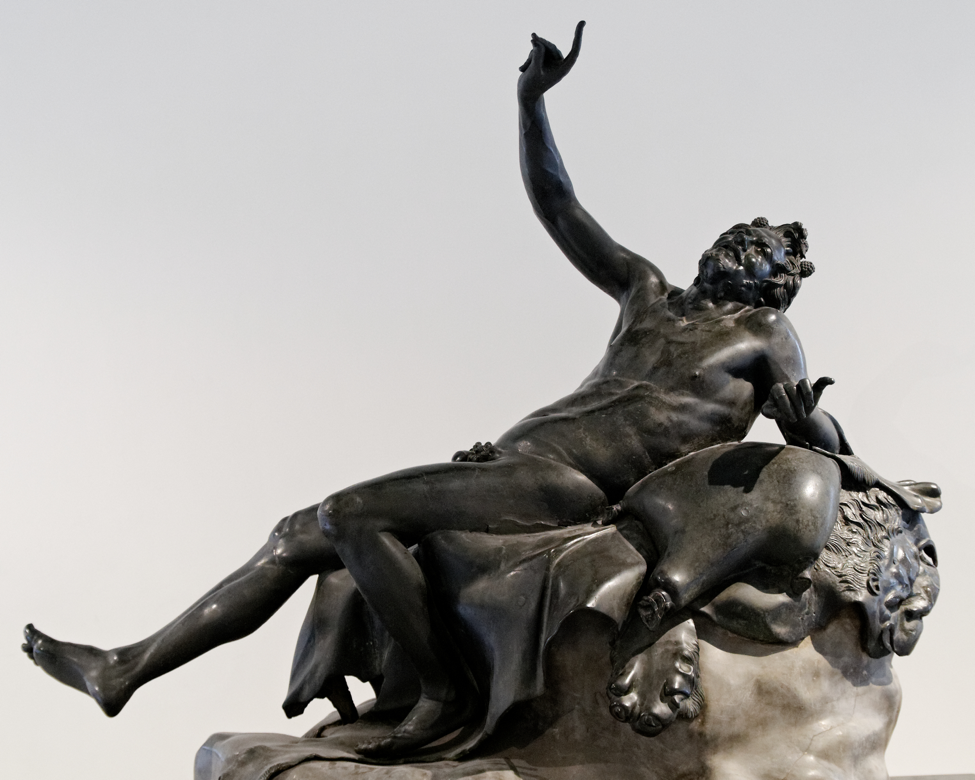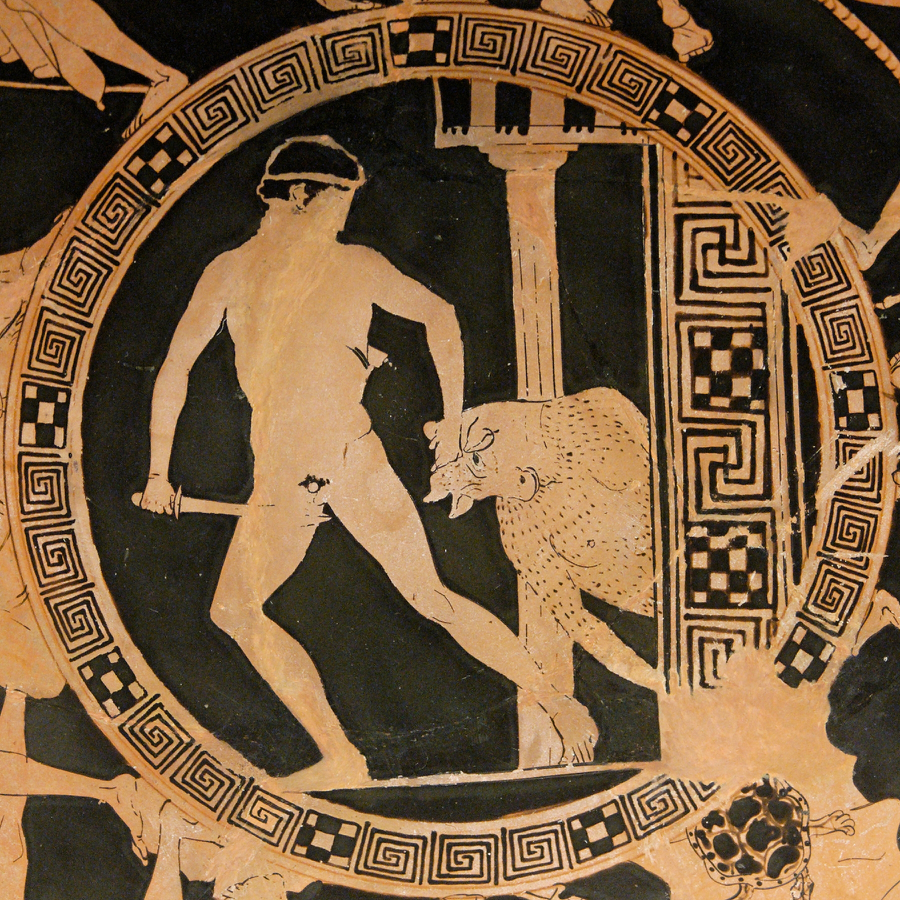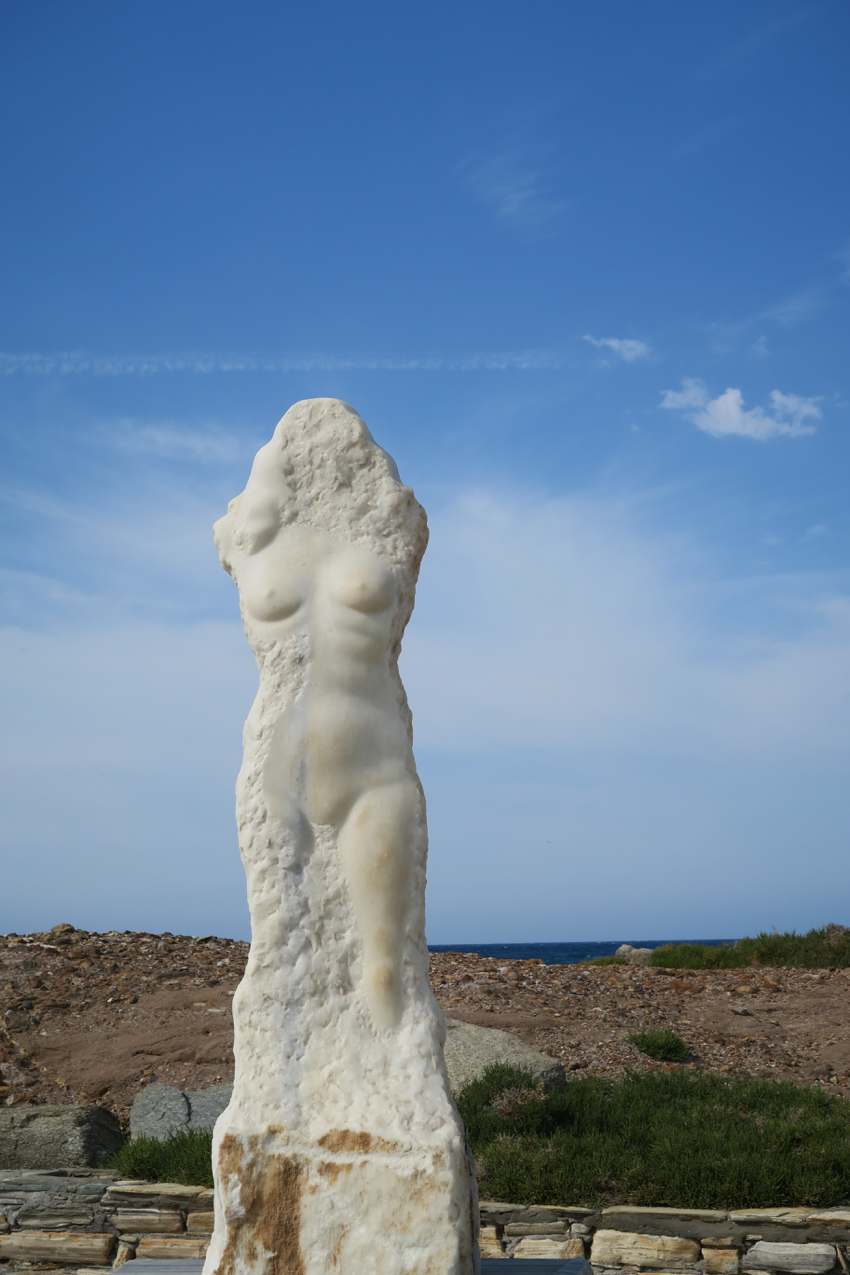Theseus
Functions: hero and king of Athens
The Birth of Theseus
Theseus was either the son of Poseidon and Aëthra, the daughter of King Pittheus of Troezen, or the son of Aëthra and Aegeus, the king of Athens [see Athenae on map]. Apparently both Aegeus and Poseidon slept with Aëthra on the same night.
Aegeus, the king of Athens, was having trouble producing an heir, so he went to the Delphic Oracle [map] to ask how he could solve his problem. The Pythia said: “Do not open the foot of the wineskin until you return home.” The meaning of this oracle, as was often the case, was unclear. On his way home to Athens, Aegeus stopped at Troezen to ask his friend, Pittheus, who was known for his wisdom, what the oracle meant. In ancient Greece, wineskins were made from a whole skin of a goat; one foot of the goatskin was used for the spout. So when the Pythia said, “Don’t open the foot of the wineskin,” she was literally saying, “Don’t uncork the wine.” But the foot of the wineskin was also very long and straight, so it was also a phallic symbol. And that is what the Pythia meant; she meant to advise Aegeus not to sleep with any woman until he returned home since the next woman he slept with would bear him a son.

Pittheus knew the meaning immediately, but instead of telling Aegeus what it meant, he chose to get Aegeus drunk and have him sleep with his daughter, Aëthra. He did this because Aegeus, as king of Athens, was very powerful, and he wanted Aëthra’s son to become king of Athens. However, Aegeus did not know that Poseidon also slept with Aëthra later that same night.
Theseus’ Early Tests
The next morning, before Aegeus left Troezen to return home to Athens, he placed a pair of sandals and a sword under a large and heavy rock. He told Aëthra that if she gave birth to a son, she should raise him. If he became strong enough to remove the rock, he told her to send the boy to him in Athens with the sword and sandals as tokens of his parentage. If he could not move the rock, however, she should keep him in Troezen.
Aëthra, of course, did give gave birth to a son. She named him Theseus, and he was so strong that he was able to move the rock and take the tokens when he was only sixteen. So, Theseus set out for Athens. Now, he could have taken the easy route to Athens by sea, but he chose the dangerous land route because he wanted to have plenty of opportunities to perform heroic deeds. He had heard of the great deeds of Heracles, of course, and he wanted to show that Heracles was not the only hero in Greece. Theseus soon ran into Periphetes, a son of Hephaestus who was known by the name Corynetes, which means “club-bearer,” because he carried around a large bronze club which he used to cave in the skull of anyone who passed by him. Theseus could not defeat him with brute strength, but he was clever and quick as well as strong, so he managed to maneuver around Periphetes and take away his club. Once Theseus had the club, it was not difficult to overpower and kill Periphetes. Having done so, Theseus continued on his journey.
Next Theseus ran into the thief Sinis, who had earned the name Pityocamptes, meaning “pine-bender,” because of his habit of bending down two separate trees and tying men’s limbs to them. After that, he would let the trees go, causing the man’s body to tear apart. Theseus did the same to Sinis. He then decided to go a little out of his way to kill the Crommyonian Sow. He dispatched her easily and returned to his journey, stopping next at the Sceironian Rocks, named for the thief who lived at the top, Sceiron. This thief would terrorize travelers by forcing them to wash his feet and, while they were doing that, kicking them off the cliffs to a giant turtle living below them which would eat the travelers. Theseus defeated Sceiron by taking a hold of the thief by the legs before he could kick and throwing him over the edge.
The last two major deeds Theseus accomplished along the way happened just outside Athens. First, he met the king of Eleusis, Cercyon, who would challenge anyone who passed by to a boxing match and kill his opponent. Theseus overpowered him with his speed and killed Cercyon. Then, in a nearby town, he ran into a man named Damastes, who had earned the name Procrustes, which means “stretcher,” because he would invite travelers to stay the night, but when they did not fit the bed he provided, he would cut down those who were too large and stretch out those who were too small. Again, Theseus treated his foe to the same punishment he dealt out to his victims. And even today people use the term “Procrustean bed” to describe a theory that has been artificially made to fit the facts (because the facts have been altered).
Theseus and Medea
Finally, Theseus arrived in Athens and went to the palace of Aegeus. Tales of his deeds on his journey had arrived before he did. Aegeus was impressed and invited the young hero to feast with him. Because of the rules of xenia [see Xenia], Theseus had not yet introduced himself, and this allowed Aegeus’ wife, Medea, to act. Medea was a witch, and by this time (sixteen years after Aegeus had consulted the oracle) she had married Aegeus and had born him a son, Medon. [For the background on how Medea came to Athens to be Aegeus’ wife, see Jason.] Medea recognized Theseus immediately and knew that if Aegeus discovered the hero’s identity, her son would not be able to inherit the throne.
Medea convinced Aegeus that the hero would side with Aegeus’ brother Pallas, who had been trying to take the throne away from Aegeus for years. She suggested that Aegeus put poison in Theseus’ wine, and the King, who was easily fooled, agreed to do this. But when the unsuspecting Theseus raised his hand to drink his wine, Aegeus recognized his own sword hooked to Theseus’ belt. In a panic, he dashed Theseus’ wine cup to the ground just as Theseus was about to drink it. Needless to say, Medea and Medon were banished from Athens.
Theseus, Ariadne, and the Minotaur
Not long after Theseus was publicly recognized as Aegeus’ son, it was time for Athens to send seven youths and seven maidens to Crete to be fed to the Minotaur [see Minotaur]. The Athenians had to do this every nine years to atone for a previous crime. When Theseus heard about this, he was appalled that Athens—a great and powerful city—was so subservient to King Minos of Crete. So Theseus volunteered to be one of the youths taken. Theseus vowed to kill the Minotaur, bring back all the Athenian youths and maidens alive, and free Athens from such a terrible burden. Aegeus was distraught; he had finally found the son he had longed for, and now the boy was about to be taken away again. But he finally agreed to let his son go because Theseus was doing it for such a noble cause. But Aegeus asked only one thing. He put black sails on Theseus’ ship as it set out for Crete, and he requested that the Athenian ship’s sails should remain black if Theseus died in the attempt against the Minotaur, but he asked Theseus to switch the sails to white if he survived. Theseus agreed, and they all sailed to Crete.
When the Athenians arrived on Crete, there was a public parade of the prisoners, and as soon as Ariadne, Minos’ daughter, saw Theseus, she immediately fell in love with him. Now the Minotaur was a monster, half-man and half-bull, who lived in the labyrinth [See Minotaur]. Ariadne knew that Theseus would need her help to kill the Minotaur and then escape from the labyrinth. So, she secretly visited Theseus in prison the night before the Athenians were going to be fed to the Minotaur, giving him a sword and a ball of thread. She told him to tie the thread to the entrance of the labyrinth, and, after he had killed the Minotaur, he could use the thread to find his way out again. Ariadne asked only one thing of Theseus: after he had killed the Minotaur and escaped from the labyrinth, he should take her back to Athens with him to be his bride. Theseus agreed.
Theseus took the ball of thread and the sword into the labyrinth, unwinding the string as he went. When he found the Minotaur, he cut his throat and then led the Athenian youths and maidens out of the labyrinth, following the trail of Ariadne’s thread. He then picked up Ariadne, who was waiting by the Athenian ship, and they quickly sailed away. Minos’ fleet could not pursue them because Ariadne had somehow found a way to bore holes into all their ships.

On the way back to Athens, the group stopped on the island of Dia (modern day Naxos) [map]. Theseus and Ariadne slept together on the island that night, but Theseus woke up around midnight. He had already escaped the labyrinth, so he no longer had any use for Ariadne, and he felt a little embarrassed at the prospect of marrying into a family that was a little strange in their sexual habits. So, while Ariadne was sleeping, Theseus quietly gathered the group of Athenians together and left the island without her. When she awoke, she found herself alone on a desert island. Ariadne was devastated, of course, and she was sure she was going to die a horrible death. But it just so happened that, later that same day, Dionysus was passing by in the midst of his travels to promote his worship. He saw Ariadne and was so smitten by her beauty that he immediately made her his wife and she became a goddess. So, everything turned out well for Ariadne (no thanks to Theseus). And if you travel to the island of Naxos today, you will see a statue of Ariadne, looking out to shore.

Theseus, however, either because he was feeling guilty about his treatment of Ariadne (and thus was preoccupied) or just acting from sheer cockiness, forgot to change the sails on his ships. So when Aegeus, watching for the return of his ship, saw the black sails, he was overcome with grief and threw himself into the sea. And the part of the Mediterranean Sea that is just off the coast of the Athenian peninsula, the Aegean Sea, is still named after him. When Theseus came home to Athens in triumph, he found his city in mourning for the death of the king.
Theseus and Hippolyte
At some point, Theseus helped the hero Heracles fight against the Amazons and brought back with him the Queen of the Amazons, Hippolyte, as his wife. The Amazons were unhappy to lose their queen and sent a force to attack Athens to regain her. The two groups fought, and Hippolyte died in battle, but not before bearing Theseus a son, Hippolytus.
The Story of Hippolytus
Many years later, Theseus married Minos’ youngest daughter, Phaedra, to smooth over relations with Crete. But when he brought Phaedra back to Athens, she fell in love with Hippolytus, who was now about 19 or 20 years old (and much closer to Phaedra in age than Theseus was). Some say that Aphrodite had caused Phaedra to do this because Hippolytus was a devotee of the virgin goddess Artemis. Since Artemis was a virgin, Hippolytus had vowed to remain a virgin as well, and Aphrodite took this as a personal affront. In any case, Phaedra was sick with love for the handsome young man. But despite her personal pain, she vowed never to breath a word of her feelings. Nevertheless, Hippolytus somehow found out. And when he found out, he was both furious and disgusted. He confronted Phaedra and called her a lot of terrible names (as you can imagine). As a result, Phaedra became bitterly angry at Hippolytus and vowed revenge. She knew she had to commit suicide; she could not live with the shame of wanting to commit adultery with her own stepson. But before she killed herself, she wrote a note to Theseus, falsely claiming that his son had raped her. Theseus believed what he read in the note despite Hippolytus’ protestations that he had nothing to do with his stepmother. But at this point, Theseus was in a rage. He banished Hippolytus from Athens and called upon his father, Poseidon, to kill the youth. As Hippolytus was driving his chariot out of Athens along the seashore, a terrifying bull emerged from the water. The horses were so frightened that they all reared up and ran in different directions. Hippolytus got tangled in the reins of his chariot and was eventually pulled apart by his horses. After this had happened, Artemis told Theseus the truth.
The Death of Theseus
Theseus now had to live with the terrible truth that he had killed his own son, and for no good reason. He continued on as king of Athens, but life was never the same. He became moody and sullen, and he neglected his duties as king. The Athenians asked him to leave, and Theseus agreed. He decided to go to the island of Scyrus, Aegeus’ homeland, and Lycomedes, the king of Scyrus, agreed to give Theseus some land that had once belonged to Aegeus. But deep down, Lycomedes felt threatened by the presence of such a great hero. As Theseus was walking with Lycomedes along the cliffs at the edge of the island, somehow Theseus tripped (or did Lycomedes push him?) and he fell to his death.

